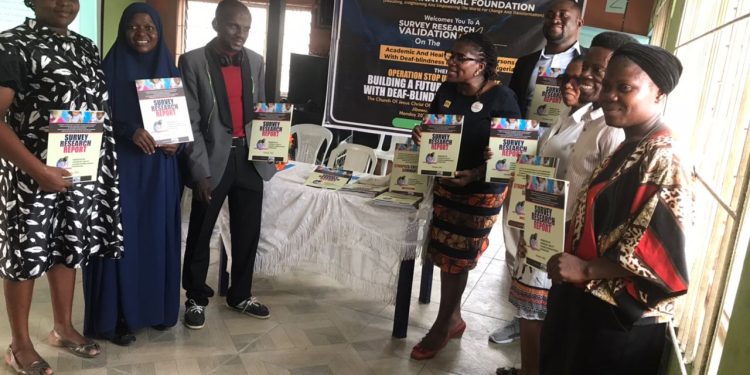Lionheart Ability Leaders International Foundation (LALIF) has called on the Lagos State Government, Stakeholders, Policy Makers, and parents to provide the necessary support for Persons with Deaf-Blindness to enable them to live a meaningful life.
LALIF made the call during a survey research validation meeting on the academic and health inclusion of persons with Deaf-blindness in Lagos State, Nigeria produced with the support of Disability Right Fund (DRF).
Giving an overview of the research reports, Mr. Solomon Okelola, the Executive Director of LALIF, explained that the research reports basically focus on the education and health needs of persons with Deaf-blindness in Lagos State.
Mr Okelola said the first research was 2-pronged, with the first aspect being “an assessment of the incidence of Deaf-blindness in Lagos State and its impact on the academic, health, and socio-emotional well-being of the affected individuals while the second bit assessed the level of awareness among teachers in Lagos State schools about Deaf-blindness and its impact on the academic and socio-emotional well-being of the affected learners.
“The second research had to do with an assessment of the level of access to primary healthcare services, COVID-19 response, and recovery efforts for persons with Deaf-blindness and other disabilities in Lagos State.”
Mr. Okelola shared that the reports were influenced by the fact that Deaf-blindness is a unique, low-incidence disability and most parents and teachers are at a loss as to how to communicate with or teach these individuals.
The LALIF Director said, “Deaf-blindness is a low incident of disability compared to other types of disability and most of the parent don’t know anything about usher syndrome which is the major cause of Deaf-blindness in the world and because of that ignorance there is a tendency that there might be a high incidence of the condition as time goes on”
He thereafter urged parents, teachers and health practitioners and other stakeholders to be trained on the nature and needs of these individuals with regard to their access to education and health
“There are ways this individual can communicate with people around them and learn. So, parents, teachers, and other stakeholders have to learn these ways so that they can include them in the flow of things around them.
“Give them equal opportunity to learn, develop their potentials and be able to live a meaningful and productive life as part of the society, Okelola added.
Also in his presentation, Dr. Friday Azanor Ovie, Lecturer at the Federal College of Education (Special), Oyo, appealed to the Lagos state government to provide relevant support organisations like LALIF that have an interest in improving the well-being of persons with Deaf-blindness
Azanor also identified the need for Deaf-blindness specialists, adding that “we discovered that most persons with Deaf-blindness are found in schools mainly for the deaf and blind, however, they need to have their own specialists who can handle, teach and communicate with them.”
On her part, Treasures Uchegbu, Convener/CEO, Speaking fingers Network referenced the need for more collaboration and partnerships to address issues concerning persons with disabilities.
She noted that there should be reasonable accommodation provided and also assistive technology be put in place for these individuals with Deaf-blindness.
The reports recommended that the Lagos State Office for Disability Affairs (LASODA), in conjunction with the Ministry of Education should design a scheme that would enhance the training of the first interveners and specialists in educating individuals with Deaf-blindness in Lagos State and the country at large.
They also emphasised that parents, teachers, and other stakeholders should be educated on the identification and prevention of Usher Syndrome and other causes of Deaf-blindness with a view to reducing the incidence of the dual disability in Lagos State and the nation as a whole.
There was a specific emphasis on the need to have sign language interpreters/ disability support desks in hospitals across Lagos State, to support the needs of persons with Deaf-blindness.
The survey on access to health involved persons with Deaf-blindness and other different disability clusters in Lagos State which include; the Down Syndrome Foundation; the Lagos State Association of the Deaf; National Association of Persons with Physical Disabilities; Nigerian Association of the Blind; Dwarfs Association of Nigeria; Association of Intellectual and Developmental Disabilities in Nigeria; and Albino Association of Nigeria.

